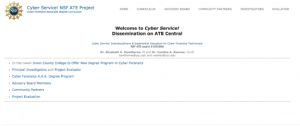Cyber Service! Interdisciplinary & Experiential Education for Cyber Forensics Technicians

According to the 2015 (ISC)2 global workforce study, the information security workforce shortfall is widening as the demand for security practitioners is dangerously outpacing the current supply. Of the almost 1,400 survey respondents, 62% stated that their organizations have too few information security professionals, which is a 6% increase from their 2013 survey. This shortfall is serious and estimated to reach 1.5 million security practitioners by 2020. This project entitled Cyber Service at Union County College (UCC) in New Jersey is designed to address this critical cybersecurity workforce shortage of the nation. The innovative curricular design focuses on the education of middle skill cyber forensics technicians. Experiential education and service learning are integrated into the curriculum to keep students engaged, to provide critical workforce readiness skills, and to instill a commitment to community service. By incorporating a community-based, service-learning capstone experience into the associate-degree program. Cyber Service is designed to advance a diverse group of students prepared to enter the well-paying industry of cyber forensics as middle-skilled technicians. The project plans for least 35% of students in the program to be identified as belonging to a population traditionally under-represented in science, technology, engineering, or mathematics (STEM) fields (e.g., female, African American, and Hispanics). Cyber Service has great potential to serve as a national model for other community colleges. National dissemination of curricular and service-learning materials specifically developed for cyber forensics technicians is planned through the National CyberWatch Center, ATE Central, ATE TV, and the Association for Computing Machinery Committee for Computing Education in Community Colleges (ACM CCECC), as well as national cyber education and experiential education conferences.
Cyber Service will address the urgent need to increase the pool of skilled cyber forensics technicians to fill high-demand jobs by employers in the northern New Jersey and New York City metropolitan region, and to improve student retention and persistence in the attainment of post-secondary credentials while preparing graduates with 21st century career ready skills. The project will adapt four digital forensics courses from the NSF ATE Advanced Cyberforensics Education (ACE) consortium. Cyber Service will then extend the work of ACE by creating three new courses that complement the consortium courses and by integrating innovative experiential education and service-learning throughout the program courses. The three new courses are 1) cloud computing and mobile device forensics, 2) cyber law and ethics, and 3) service-learning cyber capstone. The expert project team will develop a series of embedded, stackable certificates designed to culminate in an associate of applied science degree in cyber forensics investigations that is mapped to federal standards. Upon completion of the associate degree, students will be well prepared to sit for industry certification exams appropriate to cyber forensics, such the AccessData Certified Examiner. The new Cyber Capstone is a culminating course that allows students to demonstrate their interdisciplinary knowledge and technical skills learned in both the adopted and newly developed courses, as well as to build 21st century career-ready abilities and civic responsibilities through service-learning field experiences with community partners. An extensive evaluation, based on the Program Evaluation Standards of the American Evaluation Association,is planned to ensure that the project documents its achievements and improves it effectiveness relative to student success and employer satisfaction.
Comments